
Social Theories of Urban Violence in the Global South
While cities often act as the engines of economic growth for developing countries, they are also frequently the site of growing violence, poverty, and inequality. Yet, social theory, largely developed and tested in the Global North, is often inadequate in tackling the realities of life in the dangerous parts of cities in the Global South. Drawing on the findings of an ambitious five-year, 15-project research programme, Social Theories of Urban Violence in the Global South offers a uniquely Southern perspective on the violencepovertyinequalities dynamics in cities of the Global South.
Through their research, urban violence experts based in low- and middle-income countries demonstrate how urban violence means different things to different people in different places. While some researchers adopt or adapt existing theoretical and conceptual frameworks, others develop and test new theories, each interpreting and operationalizing the concept of urban violence in the particular context in which they work. In particular, the book highlights the links between urban violence, poverty, and inequalities based on income, class, gender, and other social cleavages.
Providing important new perspectives from the Global South, this book will be of interest to policymakers, academics, and students with an interest in violence and exclusion in the cities of developing countries.
Jennifer Erin Salahub managed the Safe and Inclusive Cities initiative, a global research programme jointly funded by Canadas International Development Research Centre and the United Kingdoms Department for International Development.
Markus Gottsbacher is senior programme specialist with the Governance and Justice programme at the International Development Research Centre.
John de Boer is managing director of the SecDev Group.
Routledge Studies in Cities and Development
The series features innovative and original research on cities in the Global South, aiming to explore urban settings through the lens of international development. The series particularly promotes comparative and interdisciplinary research targeted at a global readership.
In terms of theory and method, rather than basing itself on any one orthodoxy, the series draws on a broad toolkit taken from across social sciences and built environment studies, emphasizing comparison, the analysis of the structure and processes, and the application of qualitative and quantitative methods.
The series welcomes submissions from established and junior authors on cutting-edge and high-level research on key topics that feature in global news and public debate.
The Politics of Slums in the Global South
Urban Informality in Brazil, India, South Africa and Peru
Edited by Vronique Dupont, David Jordhus-Lier, Catherine Sutherland and Einar Braathen
Social Theories of Urban Violence in the Global South
Towards Safe and Inclusive Cities
Edited by Jennifer Erin Salahub, Markus Gottsbacher and John de Boer
Social Theories of Urban Violence in the Global South
Towards Safe and Inclusive Cities
Edited by Jennifer Erin Salahub, Markus Gottsbacher, and John de Boer
First published 2018
by Routledge
2 Park Square, Milton Park, Abingdon, Oxon OX14 4RN
and by Routledge
711 Third Avenue, New York, NY 10017
Routledge is an imprint of the Taylor & Francis Group, an informa business
Co-published with the
International Development Research Centre
PO Box 8500, Ottawa, ON K1G 3H9 Canada
info@idrc.ca / www.idrc.ca
The research presented in this publication was carried out with the financial assistance of Canadas International Development Research Centre and the United Kingdoms Department for International Development (DFID). The views expressed herein do not necessarily represent those of IDRC or its Board of Governors, or those of DFID.
Contributors 2018. Licensed under the Creative Commons Attribution 4.0 License. http://creativecommons.org/licenses/by/4.0

Trademark notice: Product or corporate names may be trademarks or registered trademarks, and are used only for identification and explanation without intent to infringe.
British Library Cataloguing-in-Publication Data
A catalogue record for this book is available from the British Library
Library of Congress Cataloging-in-Publication Data
Names: Salahub, Jennifer Erin, editor. | Gottsbacher, Markus, editor. | de Boer, John, editor.
Title: Social theories of urban violence in the global south : towards safe and inclusive cities / edited by Jennifer Erin Salahub, Markus Gottsbacher and John de Boer.
Description: Abingdon, Oxon ; New York, NY : Routledge, 2018. |
Series: Routledge studies in cities and development | Includes bibliographical references and index.
Identifiers: LCCN 2017052862 (print) | LCCN 2017054821 (ebook) | ISBN 9781351254724 (eBook) | ISBN 9780815368397 (hardback)
Subjects: LCSH: Urban violenceDeveloping countries. | ViolenceDeveloping countries. | UrbanizationDeveloping countries. | Urban policyDeveloping countries. | Sociology, UrbanDeveloping countries.
Classification: LCC HN981.V5 (ebook) | LCC HN981.V5 S63 2018 (print) | DDC 303.609173/2dc23
LC record available at https://lccn.loc.gov/2017052862
ISBN: 978-0-815-36839-7 (hbk)
ISBN: 978-1-351-25472-4 (ebk)
ISBN: 978-1-552-50597-7 (IDRC ebk)
Typeset in Sabon
by Out of House Publishing
Contents
CAROLINE MOSER
JENNIFER ERIN SALAHUB, JOHN DE BOER, AND MARKUS GOTTSBACHER
NAUSHEEN H. ANWAR, SARWAT VIQAR, AND DAANISH MUSTAFA
ESMERALDA MARIANO, HENNY SLEGH, AND SLVIA ROQUE
JULIE STEWART AND ROSALIE KATSANDE, WITH OLGA CHISANGO AND SIAN MASEKO
MANOJ BANDAN BALSAMANTA AND BHIM REDDY
DANESH JAYATILAKA, RAJITH W. D. LAKSHMAN, AND IRESHA M. LAKSHMAN
RODOLFO CALDERN UMAA
ENRIQUE DESMOND ARIAS AND XIMENA TOCORNAL MONTT
ROBERTO BRICEO-LEN
FRANCIS AKINDS
SAM LLOYD AND RICHARD MATZOPOULOS
JOHN DE BOER, JENNIFER ERIN SALAHUB, AND MARKUS GOTTSBACHER
Foreword
Caroline Moser is an urban social anthropologist and social policy specialist, with more than 40 years of experience relating to urban and social development issuesranging from academic to policy-focused research, teaching, and training. She has undertaken field-based research on many topics: urban poverty, urban violence, household asset vulnerability and accumulation strategies, gender and development, and the informal sector. Her work has taken her to Ecuador, Guatemala, Jamaica, and other countries. Carolines empirical research has also included social policy, community participation, the social dimensions of economic reform, human rights, and social protection. Most recently, she has studied urban adaptations to climate change in Mombasa, Kenya, and the role of womens organisations in peace processes in Colombia. Caroline has taught at a number of institutions, both in the UK (the University of Manchester, the London School of Economics, and University College London) and abroad: the New School, New York. She has held senior positions at the World Bank, the Overseas Development Institute, and the Brookings Institution. Caroline has served as an advisor to many donor agencies and has been a member of the United Nations Centre for Human Settlements (Habitat) Huairou Commission, a visiting professor at the University of Bristol, a research fellow at the World Policy Institute in New York, and a member of the panel on Urban Population Dynamics (US National Academy of Sciences).












